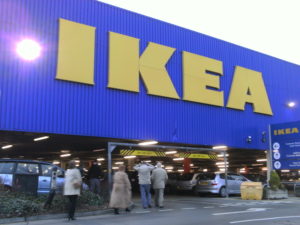Stuff and Nonsense
Are employees no longer motivated by material reward?IKEA’s Head of Sustainability Steve Howard has said that in the west ‘we have probably hit ‘peak stuff’’. This probably didn’t endear him to IKEA’s top brass who presumably fund their luxury saunas from selling the very ‘stuff’ Howard was dismissing. But you can see the point: we probably each own more than enough goods, and the overwhelming materialism of our lives may well be inducing existential crises.
Think about it. Your home will most likely have drawers, sheds, cupboards, wardrobes, dressers, boxes, shelves, baskets – all with no other purpose than to control the tonnes of possessions you’ve acquired in your life.

There are signs that there’s a growing market for having less stuff. There are TV shows called Get Your House In Order, Hoarders and Enough Already. Maybe you’ve used the services companies such as ClutterGone, Clutter Fairy or Declutter Divas.
Figures support Howard’s supposition. The Office of National Statistics reports on ‘material flow’ (the amount of stuff the UK consumes every year) and apparently it’s going down. The ONS suggests that the UK’s consumption of materials has fallen by over a fifth – which actually seems quite a lot – since 2000.
So if people are now less into stuff, they’re probably into something else instead.
And that’s what’s interesting recognition bosses.
Non-material motivation
A survey of 1,000 full and part time workers commissioned by Sodexo Benefits and Rewards Services has highlighted the fact that bonuses and pay rises are not the only way to motivate younger employees.
More than 8 out of 10 respondents (84%) agreed that a non-financial reward would help motivate them to work harder and make them more likely to stay with their current employer.

Jamie Mackenzie is Director of Marketing at Sodexo. ‘The only way for employers to truly motivate staff is to understand their needs, lifestyle and working patterns, so that they can alter their rewards accordingly,’ he says. ‘In addition to the lack of consideration regarding individuality, typical incentive and recognition schemes still revolve around the giving of tangible rewards.
‘Few staff would turn down a cash bonus, but will they really remember it a few weeks or months later? In many cases, bonuses like these are used to pay off bills or for household repairs – neither of which are likely to delight and motivate a team, or create desired business behaviours.’
So largely, then, it’s about personalisation – and experiences.
Individualism rules
‘The gift of an experience is really like no other,’ Mackenzie says. ‘Experiences can range from giving tickets to a theme park, theatre or concert to spa or driving days.’
Experiences also lend themselves to team building, which giving out stuff doesn’t. ‘Providing employees with the opportunity to visit a top restaurant as a group, or taking the full team for an away day or weekend, can give employees the chance to bond in a fun and informal environment.’
But ignore tailoring experiences at your peril, warns Mackenzie. ‘Giving an employee an irrelevant experience that doesn’t match his or her personality can be a cause for annoyance or worse, can be seen as insulting.’
In other words, taking Dave from the warehouse to see Mamma Mia or squeezing Deirdre into a racing car at Brands Hatch might have the opposite effect, engagement-wise, to the one intended.
Clearly there are some interesting experiences out there. A quick online search reveals the following:
- Flying in a Tiger Moth
- A Zombie Survival Experience
- A Falconry Taster (although presumably you don’t actually eat the falcons)
- Fly Fishing in the Western Highlands
- A dip in the Baltic Sea off the coast of Finland
Now there’s an idea for a sales incentive – the top performer gets to throw the worst performer into the Baltic Sea. Which, come to think of it, is probably what the CEO of IKEA wanted to do to his Head of Sustainability after he suggested no-one wanted to buy silly old stuff any more.